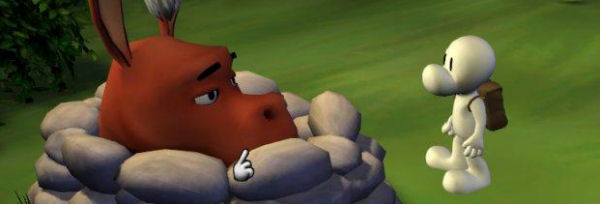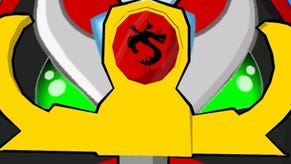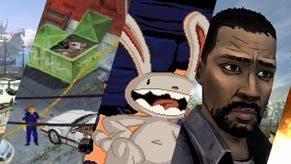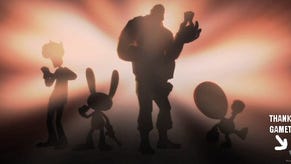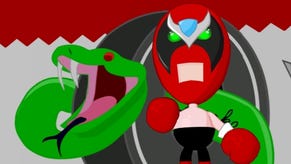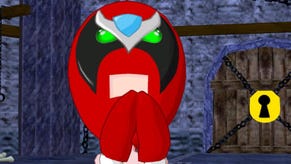RPS Exclusive: Mike Stemmle Interview
A few weeks back we heard the splendid news that LucasArts alumnus Mike Stemmle had joined Telltale. As one half of the team that created the original Sam & Max: Hit The Road, who better to get involved? So we got in touch and spoke to the man, finding out what he's been up to in the meantime, what it's like to return to S&M after all those years, the potential for the modern adventure, and how former colleague Sean Clark should have been a lot more careful at Mike's wedding.
RPS: The last time I saw you was in the depths of LucasArts, midway through the development of Monkey Island 4. So my first question has to be, does your office still look like this?
(Click for the full glory)
Mike: This picture makes me laugh, cringe, and ache at the same time. Do you know how long it takes to clear out your office when it’s got 14 years of accumulated geek crap plastered all over it?
RPS: What have you been up to since? We most recently noticed you writing superb dev diaries for the late Star Trek Online.
Mike: After my tenure at LucasArts came to an end I spent a few months doing random contract work, including a freaky gig at Cisco and some dialog work with LucasArts (irony!). Afterwards I landed at Perpetual, where I spent the last few years working in the MMO mines.
RPS: And now you’re with Telltale. Can you tell us a bit about what your role is, what you’re doing at the moment?
Mike: My business cards say “Game Designer,” and that’s pretty much what the gig’s all about. I work with the rest of the studio designers to come up with episode ideas, work out puzzle trees, write dialog, and help our producers shepherd games to completion. Right this minute I’m trying to nail down the plot and puzzles of episode three of the first season of Strong Bad’s Cool Game for Attractive People, while simultaneously chipping in (in my small, hoping-not-to-blow-anything-up way) on the frenetic efforts of the studio veterans to get episode one out the door.
RPS: Is it strange to be back so close to Sam & Max after all these years?
Mike: Strange, vertiginous, and somewhat disturbingly erotic. I keep expecting someone to tap me on the shoulder, yell “psyche!”, and hit me with a two-by-four. I’m sure this’ll pass.
RPS: So let’s get nostalgic. Does the lasting legacy of Sam & Max Hit The Road surprise you?
Mike: Quite a bit, but it’s a darned pleasant surprise. I always knew the characters were evergreen (thanks to their deal with the devil ‘n’ all), but I never suspected that anyone would even REMEMBER Hit the Road in 2008, much less quote it, port it to iPhones, and (most importantly) demand sequels to it.
RPS: Replaying it now, along with DOTT it still remains a solid, timeless piece of entertainment. (It’s embarrassing, but there’s at least two of us at Rock, Paper, Shotgun who could recite the entire opening sequence today. We’re not proud… Well, we are). What is it about S&M that gives it this longevity?
Mike: I think Hit the Road was a lucky confluence of talent, timing, and, um, let’s say “tenacity” that helped give it sort of a cultish allure; kinda like Ron Paul, only slightly less bat-feces crazy.
RPS: And for the love of God, why have so few adventures had a similar property since?
Mike: Well, a lot of that has to do with the fact most of the larger companies turned their backs on the adventure game format. There are plenty of smaller companies putting out some fine adventure games, but it’s really hard for them to get noticed.
RPS: Are you nervous returning to the format?
Mike: Not as much as I should be. Designing adventure games is a lot like riding a bike… through a maze… while trying to tell someone a story over a cell phone… with bad reception. After a while, you start recognizing the patterns in the maze, and can learn to anticipate when to calmly put down the phone for a second in order to casually make a turn.
RPS: Are you more nervous about working on an adventure without Sean Clark? What if he was the source of all your powers?
Mike: Actually, I’m pretty sure that it was Sean’s flowing head of hair that was the source of my powers. Luckily, I keep a small fetish of Mr. Clark at my desk, complete with a lock of his hair that I surreptitiously clipped while he was giving a toast at my wedding. Please don’t tell him.
RPS: Telltale are clearly bravely fighting for the adventure, with varying degrees of success. Why is this a good business strategy?
Mike: Well, I don’t know much about business strategizin’, but I do know that Telltales’s episodic model is allowing us to build satisfying, fully-formed adventure games for a mere fraction of what the older games would cost in 2008 dollars. And we get to pass the savings on to you, the player!
RPS: If you look at most genres, they’ve evolved to certain degrees over the last couple of decades. Of course sometimes this might only be to involve physics, etc, but it’s probably safe to say that the point-n-click adventure kind of got stuck about ten years back. If anything, it’s rolled backward, simplifying to a single cursor interface. What’s the next evolutionary step for the adventure? What’s the innovation that will welcome in a new generation of gamers?
Mike: Adventure game innovations will probably come from several directions, depending on the nature of the stories being told. In games in which player influence over characters is paramount, we might start seeing more systemically-driven emotional states in our characters, rather than the brute-force approach that is typically taken today. We may also start seeing more experimental adventures in which the primary interactions players have with the worlds revolve around something other than “looking and using,” a la the musical staff in Loom. Of course, the driving impetus for these developments must grow organically out of the adventure’s story, or they’ll be perceived as tacked on gimmicks.
RPS: Ron Gilbert’s gone back to adventure development, you’ve returned, and we’re still trying to convince Al Lowe to take another shot. Is there a revolution around the corner? Are the old guard about to take over?
Mike: I just had this sudden image of myself, Gilbert, Lowe, Grossman, Schafer, Moriarty, Barwood et al in a scene from either Wild Hogs or Space Cowboys, so darn you. Darn you all to heck. Seriously (sorta), I just think that we’re coming back to adventure games because they’re a lot more viable these days then they have been for the last half-decade or so.
RPS: What’s the one adventure game series you’d love to get the chance to revive?
Mike: Although I’m a pretty forward-thinking guy (he said without a hint of irony while scribbling down ideas for a third season of Sam & Max), I’d like to take a whack at Maniac Mansion someday. A closed environment adventure game with multiple player characters and bouncy Lovecraftian tentacles… squee!
RPS: Good luck with your new job!
Mike: Thank you for the cool questions. And hey, check out Strong Bad’s Cool Game for Attractive People, coming soon to a Wii or PC near you!
RPS: That was smooth.





